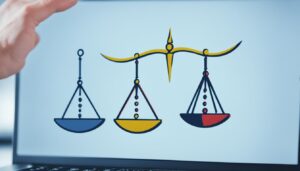
In the digital era, the collection and processing of personal data have become prevalent practices for organizations across various industries. As a result, data protection laws have been established to ensure the privacy and security of individuals’ sensitive information. These laws play a crucial role in governing how organizations handle personal data and have far-reaching implications for consumers.
Understanding data protection laws is of paramount importance for consumers as they navigate the digital landscape. These laws grant individuals control over their personal information, including how it is collected, stored, and used. By empowering consumers with knowledge about their rights and the obligations of organizations, data protection laws enable informed decision-making regarding the products and services they engage with.
Furthermore, data protection laws provide consumers with recourse in the event of privacy breaches or unauthorized access to their personal data. Individuals have the right to access and correct their information, as well as the ability to request its deletion from organizations’ databases. These protections not only protect consumers’ privacy but also mitigate the risk of identity theft and other nefarious activities.
Key Takeaways:
- Data protection laws safeguard consumer privacy and sensitive information in the digital era.
- Understanding these laws empowers consumers to make informed choices about their personal data.
- Consumers have rights to access, correct, and delete their personal information held by organizations.
- Data protection laws mitigate the risk of unauthorized access, data breaches, and identity theft.
- Organizations must comply with data protection laws to ensure consumer rights are upheld.
The Importance of Data Protection Laws
Data protection laws play a critical role in safeguarding consumer privacy and security. By establishing strict regulations on how organizations handle personal data, these laws help prevent unauthorized access, data breaches, and identity theft.
With the increasing prevalence of data-driven technologies, understanding these laws is essential to protect personal data and maintain control over one’s digital identity.
These laws not only focus on the security of personal information but also empower individuals by giving them the right to access, correct, or delete their data held by organizations.
“Data protection laws are crucial for maintaining trust between organizations and consumers. They ensure that personal information is treated with the utmost care and respect, fostering a safe and secure digital environment.”
It is important to note that these laws are not limited to a specific industry or region. They apply to businesses operating both locally and internationally, ensuring a consistent level of protection for individuals regardless of their geographic location.
By complying with data protection laws, organizations demonstrate their commitment to respecting consumer privacy and upholding ethical data practices. This fosters trust among consumers, leading to stronger relationships and brand loyalty.
https://www.youtube.com/watch?v=03s80JgBmqY
Key Rights and Protections for Consumers
Data protection laws provide important rights and protections for consumers, ensuring their personal information is safeguarded. These laws give individuals control over their data, allowing them to make informed choices about how their personal information is collected, stored, and used.
One of the key rights provided by data protection laws is the right to access personal information. Consumers have the right to request and receive information about the data that organizations hold about them. This allows individuals to verify the accuracy of their data and ensure that it is being handled in accordance with the law.
Another essential protection offered by data protection laws is the right to data portability. This means that consumers have the right to receive their personal information in a commonly used and machine-readable format. This empowers individuals to move, copy, or transfer their data from one organization to another, facilitating greater control over their personal information.
Data protection laws also grant individuals the right to correct or amend their personal information. If consumers discover that their data held by an organization is inaccurate or incomplete, they have the right to request that it be corrected or updated. This helps ensure that the information being used is up to date and accurate, minimizing the risk of misinformation or incorrect decision-making.
Furthermore, data protection laws protect consumer rights by giving individuals the right to object to certain uses of their personal information. Consumers have the right to object to the processing of their data for direct marketing purposes, as well as for reasons related to their individual situation. This allows individuals to have a say in how their data is used and to prevent unwanted or unfair use of their personal information.
“Data protection laws provide consumers with important rights and protections, empowering them to control their personal information and make informed choices about its use.”
By granting these key rights and protections, data protection laws help consumers maintain control over their personal information and ensure that it is being handled responsibly by organizations. Understanding these rights is crucial for consumers to exercise their data protection rights effectively and hold organizations accountable for their compliance with data protection laws.
| Key Rights | Explanation |
|---|---|
| Right to Access | Consumers have the right to access and receive information about their personal data held by organizations. |
| Right to Data Portability | Individuals have the right to receive their personal information in a portable format and transfer it to another organization. |
| Right to Rectification | Consumers can request the correction or amendment of their inaccurate or incomplete personal information. |
| Right to Object | Individuals have the right to object to the processing of their personal data for specific purposes. |
Staying Compliant with Data Protection Laws
To ensure compliance with data protection laws and protect consumer rights, organizations must prioritize the implementation of robust data protection measures. Compliance with these laws not only minimizes the risk of legal consequences but also builds trust with consumers who prioritize the security and privacy of their personal information.
First and foremost, organizations must familiarize themselves with the data protection laws specific to their jurisdiction. This includes staying updated on any recent amendments or additions to these laws. By understanding the legal requirements, organizations can develop comprehensive data protection policies and procedures that align with the regulations.
One critical aspect of data protection compliance is obtaining consumer consent for the collection and processing of their personal data. Organizations must provide clear and transparent information about the purpose and scope of data collection, giving consumers the opportunity to make informed decisions. Additionally, organizations must ensure that consumer data is securely stored and protected from unauthorized access or breaches, taking necessary technical and organizational measures to safeguard the data.
Regular monitoring and auditing of data protection practices are crucial for maintaining compliance. Organizations should conduct internal audits to identify any areas of non-compliance and take immediate corrective actions. It is also vital to stay updated on emerging technologies and practices in data protection to continually enhance security measures.
FAQ
What are data protection laws?
Data protection laws are regulations designed to safeguard the privacy and sensitive information of individuals in the digital era. They govern how organizations collect, store, and process personal data, ensuring that consumer rights are protected.
Why are data protection laws important?
Data protection laws play a critical role in safeguarding consumer privacy and security. By establishing strict regulations on how organizations handle personal data, these laws help prevent unauthorized access, data breaches, and identity theft. They also empower individuals by giving them the right to access, correct, or delete their personal information held by organizations.
What rights and protections do data protection laws provide for consumers?
Data protection laws provide several key rights and protections for consumers. These include the right to access and control their personal information, the right to be informed about how their data is being used, the right to correct or update inaccurate data, and the right to have their data deleted under certain circumstances.
How can organizations stay compliant with data protection laws?
To ensure compliance with data protection laws and protect consumer rights, organizations must follow best practices for data handling, such as implementing secure data storage and processing systems, obtaining explicit consent for data collection and usage, conducting regular data protection audits, and providing clear and transparent privacy policies.
Source Links
- https://www.wkyc.com/article/news/crime/urban-air-fight-copley-police/95-409fc4ed-4bde-43fa-8428-c953e6b6fb75
- https://www.kgw.com/article/news/crime/hit-and-run-i-84-teen-injured/283-c595f079-4cb5-4b5a-b68b-b2581b30835f
- https://www.krem.com/article/entertainment/tom-segura-friday-headliner-great-outdoor-comedy-festival/293-cb64370e-7d97-4ddf-8e5b-78c32deae5ab









